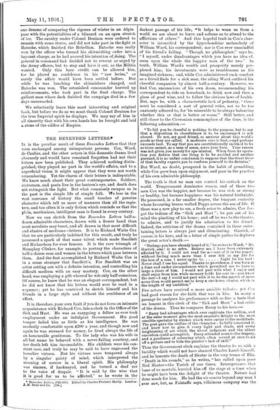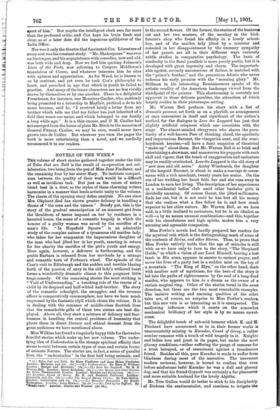THE BENENDEN LETTERS.*
IT is the peculiar merit of these Benenelen Letters that they were exchanged among unimportant persons. Cox, Ward, de Caulier, and the other actors in this domestic drama lived obscurely and would have remained forgotten had not their letters now been published. They achieved nothing distin- guished, they played no part in the world's affairs, and to a superficial vision it might appear that they were not worth remembering. Yet the charm of their letters is indisputable. We know much about their great contemporaries. Soldiers, statesmen, and poets live in the lantern's eye, and death does not extinguish the light. But what commonly escapes us in the past is the simple life of simple folk. We lose in the vast canvases of history the small touches of genuine character which tell us more of manners than all the regis- ters, and too often it is only fiction which reminds us that the plain, meritorious, intelligent man is found in every century.
Now we can sketch from the Beholden. Letters half-a- dozen admirable characters, drawn with a firmer hand than most novelists may boast, and all drawn in that most difficult and elusive of mediums—letters. It is to Richard Waite Cox that we are particularly indebted for this result, and truly he possessed a spark of that same talent which made Smollett and Richardson for ever famous. It is the rare triumph of Humphry Clinker, for example, to portray the characters of half-a-dozen men and women in the letters which pass between them. And the feat accomplished by Richard Waite Cox is in a sense stranger that Smollett's. For Smollett was an artist setting out with a definite intention, and controlling his difficult medium with an easy mastery. Con, on the other hand, was employing a gift whereof he wds only half-conscious. Of course, he knew that he was an elegant correspondent, but he did not know that his letters would ever be read in a uquence ; yet he has contrived to sketch himself and his friends in a large style and without the semblance of an effort.
It is, therefore, your own fault if you do not form an intimate acquaintance with Richard Cos, late a clerk in the Office of the Sick and Hurt. He was as easygoing a fellow as ever took employment under an indulgent Government. His good temper failed him as little as his intelligence. He was modestly comfortable upon 2200 a year, and though now and again he was stressed for money, he lived always the life of an honowable gentleman. To the lady who was his wife in all but name he behaved with a never-failing courtesy, and her death left him inconsolable. His children were his con- stant care, and truly he may be said to have engrossed the homelier virtues. But his virtues were tempered always by a singular gaiety of mind, which interpreted the meaning of sorrow in a liberal spirit. His philosophy was sincere, if hackneyed, and he turned a deaf ear to the voice of despair. "It is said by the wise that it is good for us to be afflicted," so he wrote in. the
• Benenden Letters, 1763-1821. Edited by Charles Frederic Hardy. London : J. If. Dent and Co. [Me.]
darkest passage of his life; 'it helps to wean us from a world we are about to leave, and softens us to attend to the afflictions of others." And this hopeful trait in Con's char- acter is intensified by the hypochondriac melancholy of William Ward, his correspondent; nor is Con ever unmindful of his friend's failing. "Though no philosopher," says he. "I myself, under disadvantages which you have no idea of, seem upon the whole the happier man of the two." In truth, William Ward's wealth and prosperity merely per- plexed him; his investments were as troublesome as his imagined sickness; and, while Cox administered such comfort as a friend finds for a sick man, the ailing Ward outlived his cheerful companion by almost half-a-century. However, we find Con, unconscious of his own doom, recommending his correspondent to ride on horseback, to drink now and then a glass of good wine, and to follow the obvious laws of health. But, says he, with a characteristic lack of pedantry, "these must be considered a sort of general rules, not to be too anxiously adhered to, for lie miserable to be always balancing whether this or that is better or worse." Still better, and still closer to the Ciceronian commonplace of the time, is the following admonition :—
" To bid you be cheerful is nothing to the purpose, but to say that a disposition to cheerfulness is to be encouraged is not absurd. Be not, my good friend, so anxious about this world's goods as they are called. A moderate care is best,—and perhaps succeeds best. To say that you are constitutionally inclined to be anxious cannot, as a man of sense, serve your turn. Your reason was not given you merely for speculation. When from its opera- tion you deduce that one thing is to be avoided and another pursued, ills no unfair conclusion to suppose that the Great Giver of that faculty expects you to conform yourself to its dictates."
But Ward, no doubt, prospered in the habit of grumbling, while Cox grew lean upon enjoyment, and poor in the practice of his own admirable philosophy.
The truth is that no man can control his outlook on the world. Temperament dominates reason, and of these two men Con was the happier, not because he was rich or strong or healthy, but because happiness was his natural birthright.
He possessed, in a far smaller degree, the buoyant curiosity whose favouring breeze wafted Pepys across the sea of life. If there was a new play to see, a fresh actor to admire, Con for-
got the tedium of the " Sick and Hurt "; lie put out of his mind the pinching of his home; and off he was to.the theatre.
to admire, and' to justify his admiration to his friend. Indeed, the criticism of the drama contained in these enter- taining letters is always just and illuminating. Garrick, of course, is his hero, and in a letter of simple pathos lie deplores the great actor's death "Perhaps you have already heard of it," he writes to Ward; "Mr. Garrick, alas ! is no m8re. Believe me. I have been extremely affected by it. I could not read the account of it in the papers without feeling much more than I ever felt in my life for
the loss of a man I never spoke to Light lie his turf ! Never shall I see his equal. Thanks to providence. I was born at a time and under circumstances which permitted me to have so large a share of him. I would not part with what I enjoy and shall enjoy from him while memory holds his seat in—you know the rest—I say I would not part with it to be the master of more acres than would permit me to keep a one-horse chaise, which is the length of my ambition."
Few actors have received a more amiable tribute ; yet CO!C had good reason for the faith that was in him. In many a passage he analyses his performance with so fine a taste that we lament in this clerk of the "Sick and Hurt" a lost critic of the drama. Thus he compares Barry to his hero:— " Barry had advantages which ever captivate the million, and at the same moment give the most exquisite delight to the most sensible spectator by strokes which were caviar to the multitude. The poet gave the outline of the eharacter he fully conceived it, and knew how to give it every light and shade, and every heightening of art which the nicest judgment and the ablest execution could accomplish. Barry attended more to the drapery, and a gaudiness of colouring which often served at once to set off a picture and to hide the painter's lack of skill."
Thus the Government clerk explains the theatre to us with a lucidity which would not have shamed Charles Lamb himself, and he laments the death of Shuter in the very terms of Ella. "Death in his rounds," so he writes, "has called upon poor Ned Shuter—the .Yorick of our times. Intemperance, that bane of us mortals, hurried him off the stage at a time when he might have been the delight of the theatre. Nature had done much for him. He had the vie comica beyond any man I ever saw, but, as Falstaffe says, villainous company was the
sport of him." But maybe the intelligent clerk sees far more than the professed critic, and Cox kept his brain fresh and clear, as at a later date did the ingenious quilldriver of the India Office.
Nor was it only the theatre that fascinated Cox. Literature of every sort was his constant study. "Mr. Shakespeare" was ever on his tongue, and his acquaintance with comedies, new and old, was both wide and deep. Now we find him quoting Johnson's Lives of the Poets, now referring to Conyers Middleton's translation of Cicero, and whatever interests him he cites with aptness and appreciation. As for Ward, he is known to us by contrast, and yet even he took Car's philosophy to heart, and preached in age that which in youth he failed to practise. And many of the lesser characters are no less vividly drawn by themselves or by one another. There is a delightful Frenchman, for instance, one Monsieur Caulier, who, suddenly being promoted to a tutorship in Mayfair, prefixed a de to his name because, said he, "I received lately a letter from my brother which tells me that my father has just inherited of a field that wears our name, and which belonged to our family a long while ago." It is a thin excuse, and if M. Caulier had notemerged from the house of plain Mr. Birch to the mansion of General Fitzroy, Caulier, we may be sure, would never have grown into de Collier. But wherever you turn the pages the book is more entertaining than a novel, and we cordially recommend it to our readers.







































 Previous page
Previous page